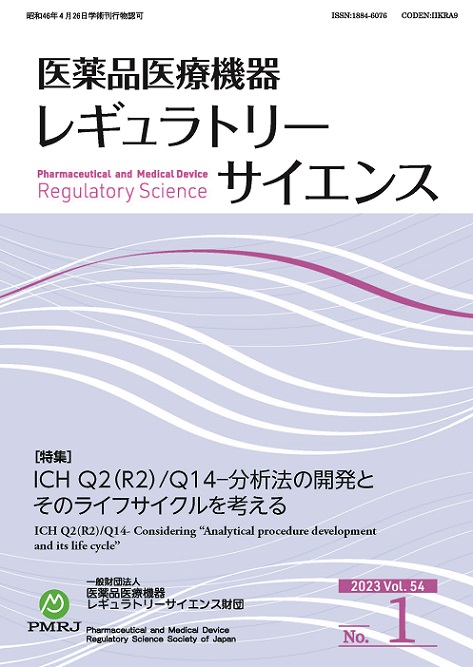54 巻, 1 号
選択された号の論文の13件中1~13を表示しています
- |<
- <
- 1
- >
- >|
特集 ICH Q2(R2)/Q14-分析法の開発とそのライフサイクルを考える
-
2023 年54 巻1 号 p. 2-13
発行日: 2023年
公開日: 2023/03/10
PDF形式でダウンロード (1056K) -
2023 年54 巻1 号 p. 14-21
発行日: 2023年
公開日: 2023/03/10
PDF形式でダウンロード (562K) -
2023 年54 巻1 号 p. 22-29
発行日: 2023年
公開日: 2023/03/10
PDF形式でダウンロード (551K) -
2023 年54 巻1 号 p. 30-35
発行日: 2023年
公開日: 2023/03/10
PDF形式でダウンロード (417K)
今月のTopic 規制
-
2023 年54 巻1 号 p. 36-42
発行日: 2023年
公開日: 2023/03/10
PDF形式でダウンロード (399K)
今月のTopic 開発
-
2023 年54 巻1 号 p. 43-46
発行日: 2023年
公開日: 2023/03/10
PDF形式でダウンロード (322K) -
2023 年54 巻1 号 p. 47-50
発行日: 2023年
公開日: 2023/03/10
PDF形式でダウンロード (263K) -
2023 年54 巻1 号 p. 51-54
発行日: 2023年
公開日: 2023/03/10
PDF形式でダウンロード (315K)
投稿 総説
-
2023 年54 巻1 号 p. 55-68
発行日: 2023年
公開日: 2023/03/10
PDF形式でダウンロード (6036K)
投稿 原著
-
2023 年54 巻1 号 p. 69-81
発行日: 2023年
公開日: 2023/03/10
PDF形式でダウンロード (4536K)
財団Information 研修会プロシーディング
-
2023 年54 巻1 号 p. 82-86
発行日: 2023年
公開日: 2023/03/10
PDF形式でダウンロード (261K) -
2023 年54 巻1 号 p. 87-91
発行日: 2023年
公開日: 2023/03/10
PDF形式でダウンロード (759K)
財団Information 報告書
-
2023 年54 巻1 号 p. 92-96
発行日: 2023年
公開日: 2023/03/10
PDF形式でダウンロード (312K)
- |<
- <
- 1
- >
- >|
